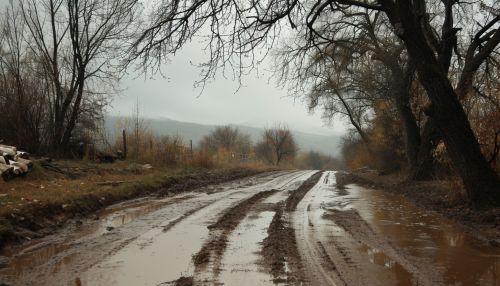Rasputitsa
Introduction
Rasputitsa is a season that occurs twice a year in Eastern European regions, specifically in Russia and Belarus. The term "Rasputitsa" is derived from the Russian word "rasputit", which translates to "to make a road impassable". This season is characterized by the poor condition of roads due to wet and muddy conditions, making them difficult or even impossible to traverse. It typically occurs during the spring and autumn seasons when the snow melts or heavy rains fall, respectively.


Historical Context
Rasputitsa has played a significant role in shaping the history of Eastern Europe, particularly in military operations. The muddy conditions during this season have often hindered the progress of invading armies, thereby influencing the outcomes of significant battles and wars.
Napoleonic Wars
One of the most notable instances where Rasputitsa played a crucial role was during the Napoleonic Wars. In 1812, Napoleon Bonaparte led the French Grande Armée in an invasion of Russia. The autumn Rasputitsa set in, turning the roads into muddy swamps and significantly slowing down the French army's retreat. The harsh conditions, coupled with the Russian winter, decimated Napoleon's forces, leading to their ultimate defeat.
World War II
Rasputitsa also had a significant impact during World War II. The German army, unprepared for the harsh conditions of the Russian autumn, found their advance severely impeded during the Rasputitsa season. The muddy conditions hindered the movement of troops and vehicles, contributing to the failure of Operation Barbarossa, the German invasion of the Soviet Union.
Geographical and Climatic Factors
Rasputitsa is primarily caused by the unique geographical and climatic conditions of Eastern Europe. The region's flat terrain, combined with its high water table and clay-rich soils, contributes to the formation of mud during periods of heavy rainfall or snowmelt.
Spring Rasputitsa
Spring Rasputitsa occurs when the winter snow begins to melt, saturating the ground with water. The top layer of the ground thaws while the layer beneath remains frozen, preventing the water from seeping deeper into the ground. This results in the formation of a thick layer of mud on the surface.
Autumn Rasputitsa
Autumn Rasputitsa is caused by the heavy rainfall typical of Eastern Europe's autumn season. The rain saturates the already waterlogged soil, creating a layer of mud that can be several feet deep.
Impact on Transportation and Economy
The poor road conditions during Rasputitsa significantly impact transportation and the economy in affected regions. The impassable roads hinder the movement of goods and people, leading to isolation of communities and economic stagnation.
Transportation
During Rasputitsa, many roads become impassable, cutting off remote areas from major cities. This can lead to delays in the delivery of goods and services, impacting various sectors of the economy.
Economy
The economic impact of Rasputitsa is significant. The agricultural sector, in particular, is heavily affected as farmers struggle to transport their produce to markets. Additionally, the construction industry often experiences delays as the transportation of materials becomes challenging.
Mitigation Efforts
Various efforts have been made to mitigate the effects of Rasputitsa. These include the construction of roads with improved drainage and the use of vehicles designed to navigate muddy conditions.
Road Construction
One common mitigation strategy is the construction of roads with better drainage systems. These roads are designed to quickly drain water, reducing the formation of mud.
Specialized Vehicles
Another strategy is the use of specialized vehicles designed to navigate muddy conditions. These vehicles, often equipped with caterpillar tracks or large, wide tires, can traverse roads affected by Rasputitsa more effectively than conventional vehicles.
